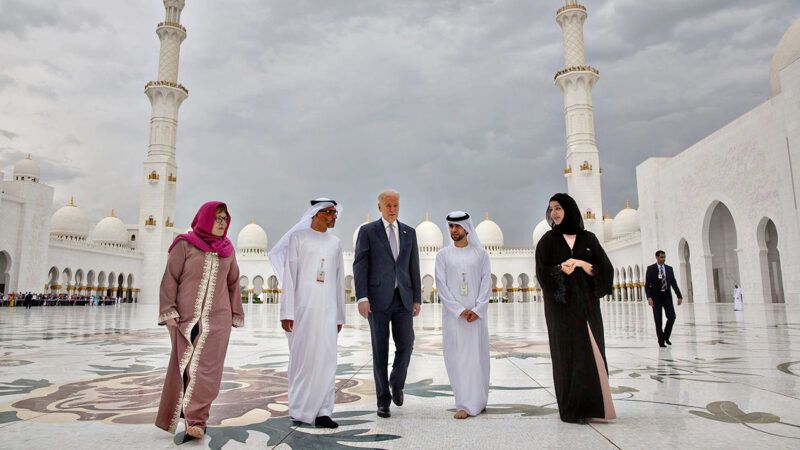The U.S. Says the UAE Has 'Significant Human Rights Issues.' They Might Enter a Defense Agreement Anyway.
The Biden administration is reportedly considering a security agreement that would further intertwine the U.S. with an authoritarian, untrustworthy regime.

President Joe Biden is currently visiting with heads of state in the Middle East in an attempt to strengthen ties in the region. But one of the moves Biden may be on the verge of making, according to previous reports, could put American lives and money on the line for a questionable ally.
Several current and former U.S. government officials told Axios in June that the Biden administration and the United Arab Emirates (UAE) were "discussing a possible strategic agreement that would give the Gulf country certain U.S. security guarantees." Those talks reportedly began last November and became more serious this spring. Brett McGurk, the White House's Middle East coordinator, visited Abu Dhabi in late May to discuss what the Biden administration calls a "Strategic Framework Agreement."
It isn't yet clear exactly what the U.S. will promise the UAE. An Axios source noted that the draft agreement "includes a component on defense and security but also covers economic, trade, science and technology issues." Still, it's possible that the agreement could involve a defense guarantee that might see American lives and resources helping protect the UAE in times of conflict.
If that's the case, it "will come with real costs for the United States," says Dan Caldwell, vice president of foreign policy at Stand Together. "It will require the permanent deployment of more U.S. troops and military assets to the Middle East at [a] time when we should be drawing down in the region."
A security commitment to the UAE "could also raise the risk that the United States gets sucked more into the war in Yemen, which the UAE has been one of the main participants in, or a conflict with Iran," notes Caldwell.
The U.S. is already deeply involved in the UAE's security, with American military forces present there since 1990. The U.S. accounted for 68 percent of the UAE's arms imports from 2015 to 2019. After Yemen's Houthi rebels carried out missile and drone strikes in the UAE earlier this year, the U.S. deployed fighter jets and transferred a guided-missile destroyer to help. Plus, the two nations already have several defense cooperation agreements, which date back to 1987.
In spite of that assistance, the UAE has proven to be a shaky ally. It's refused to increase its oil output, even as global prices soar. In a United Nations vote, it abstained from condemning Russia's invasion of Ukraine. Emirati officials have reportedly even refused to take Biden's calls. None of that begins to touch on the UAE's "significant human rights issues," in the words of the State Department, or the atrocities it's committed in Yemen as it wages war there alongside Saudi Arabia.
That track record may be indicative of what a security guarantee between the U.S. and UAE could involve. Much like the uncomfortable U.S. relationship with Saudi Arabia, forging a security agreement with the UAE would further intertwine the U.S. with an authoritarian, untrustworthy regime. There would be no clear incentive for good behavior on the part of the UAE. Rather, with the backing of a power like the U.S., the Emiratis may be more willing to take risky actions, knowing that the U.S. will bail them out if a conflict escalates.
Worse, the Biden administration has reportedly taken these steps without input from Congress. "Offering security guarantees on behalf of the American people is a serious undertaking—one that requires the engagement with, and approval of, the people's representatives in Congress," one senior Democratic Senate aide told Jon Hoffman, a George Mason University political science Ph.D. candidate writing for Foreign Policy. "I'm not aware of any such engagement thus far."
Last week, Reps. Ro Khanna (D–Calif.) and Ilhan Omar (D–Minn.) introduced amendments to the National Defense Authorization Act that would place limits on new defense agreements in the Middle East. One amendment would classify "any written United States commitment to provide military security guarantees" to either Saudi Arabia or the United Arab Emirates as a treaty, thus requiring it to receive a supermajority in the Senate. Another would require Congress to approve "any new security agreement" with the two countries before American funds could be allocated to their defense.
Such checks are important when the executive branch takes foreign policy matters into its own hands. Ideally, though, the Biden administration would realistically assess the risks that come with security guarantees. A defense commitment doesn't simply involve words on paper—it represents a broadened U.S. military mandate that could one day require the nation and its soldiers to take on extreme and unjustified risks, with little clear benefit to be gained.


Show Comments (17)